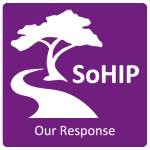 We reverse the downward spiral of poverty by empowering people through holistic development.
We reverse the downward spiral of poverty by empowering people through holistic development.
The downward spiral of poverty continues because of three things: unsafe water, malnutrition, and the inability to secure income. In order to bring holistic solutions, health education, vocational training, and business development must also be a part of the approach. Resource Centers are designed to address the needs of the community, demonstrate innovative solutions, provide vocational skills classes, provide laboratory access for various quality tests, train farmers and entrepreneurs, and serve as a community hub for inspiration, opportunity, and development.
Resource Centers
Our vision for the resource centers is to equip local people to bring hope and transformation to their communities by being trained in interventions that meet their most critical needs. SoHIP takes a holistic approach to community development, which considers every aspect of allows individuals and communities to participate in the areas most relevant to their needs.
HOLISTIC APPROACH COMPONENTS
iWASH
- Water, Sanitation, and Hygeine
- Borehole Management
- Community Health Promoters
- Drill Teams + trainings
- BioSand Filters + factory
Vocational Trainings
- Sewing Classes
- Bike Repair
- Computer Classes
- Carpentry
- Welding
Agriculture
- Sohipo Village (ex.)
- Farming as a Business
- Irrigation Solutions
- Growing Nutrient Rich Produce
Business Development
- Entrepreneurship
- Accountable Community Fundraising
- Strategic + Financial Planning
- Small Business Planning
Health
- AIDS/HIV Education
- Malaria awareness
- Health + Nutrition Classes
- Maternal + Child health promotion
- Water-related disease prevention
Personal Development
- Gratitude
- Integrity
- Worship
- Excellence
- Values + Morals
The combination of a holistic approach is that people begin to build on their successes, are trained to sustain the changes in their communities, and are empowered to reverse the cycle of poverty in their country. SoHIP has taken this approach and partnered with various organizations to train people from over 22 different nations, including Zimbabwe, Rwanda, Uganda, Kenya, Afghanistan, India and Mozambique.
